Significance of CSR in Business: Examples and Analysis
VerifiedAdded on 2022/10/06
|7
|1896
|18
Report
AI Summary
This report delves into the concept of Corporate Social Responsibility (CSR) within the context of business organizations. It elucidates the multifaceted role and contribution of CSR, supported by relevant examples. The report highlights how CSR involves self-regulation to ensure social accountability to stakeholders, including employees, customers, shareholders, and the community. It emphasizes that CSR considers economic, social, and environmental factors, leading to enhanced reputation, brand image, and customer loyalty, thereby providing a competitive advantage. The report provides examples of CSR activities, such as charitable giving and improved labor practices. Furthermore, it discusses the importance of monitoring and evaluation within CSR programs to measure performance and communicate the impact of these programs on the organization's smooth functioning and future performance. The report also emphasizes CSR's role in building strong relationships with the public, improving social change, and addressing community problems, ultimately leading to a positive impact on social, environmental, and economic factors. Specific examples, such as philanthropy and ethical resource management, are provided to illustrate the practical applications of CSR. The report also touches upon CSR's role in employee engagement, talent retention, customer relationships, and sustainable development, concluding that CSR is crucial for organizational development and long-term success.

Running Head: MANAGEMENT
0
Managing Across Borders
8/7/2019
0
Managing Across Borders
8/7/2019
Paraphrase This Document
Need a fresh take? Get an instant paraphrase of this document with our AI Paraphraser
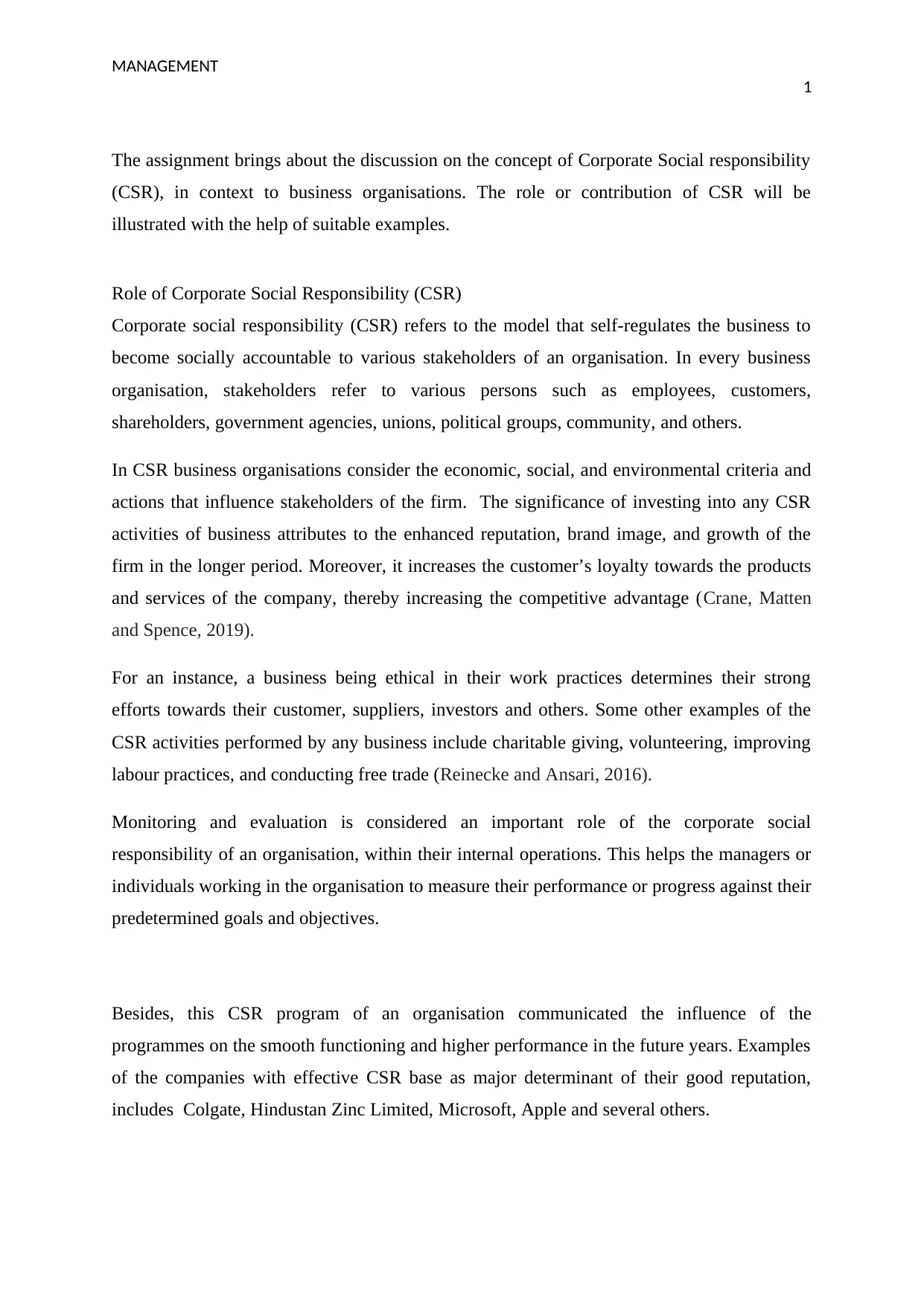
MANAGEMENT
1
The assignment brings about the discussion on the concept of Corporate Social responsibility
(CSR), in context to business organisations. The role or contribution of CSR will be
illustrated with the help of suitable examples.
Role of Corporate Social Responsibility (CSR)
Corporate social responsibility (CSR) refers to the model that self-regulates the business to
become socially accountable to various stakeholders of an organisation. In every business
organisation, stakeholders refer to various persons such as employees, customers,
shareholders, government agencies, unions, political groups, community, and others.
In CSR business organisations consider the economic, social, and environmental criteria and
actions that influence stakeholders of the firm. The significance of investing into any CSR
activities of business attributes to the enhanced reputation, brand image, and growth of the
firm in the longer period. Moreover, it increases the customer’s loyalty towards the products
and services of the company, thereby increasing the competitive advantage (Crane, Matten
and Spence, 2019).
For an instance, a business being ethical in their work practices determines their strong
efforts towards their customer, suppliers, investors and others. Some other examples of the
CSR activities performed by any business include charitable giving, volunteering, improving
labour practices, and conducting free trade (Reinecke and Ansari, 2016).
Monitoring and evaluation is considered an important role of the corporate social
responsibility of an organisation, within their internal operations. This helps the managers or
individuals working in the organisation to measure their performance or progress against their
predetermined goals and objectives.
Besides, this CSR program of an organisation communicated the influence of the
programmes on the smooth functioning and higher performance in the future years. Examples
of the companies with effective CSR base as major determinant of their good reputation,
includes Colgate, Hindustan Zinc Limited, Microsoft, Apple and several others.
1
The assignment brings about the discussion on the concept of Corporate Social responsibility
(CSR), in context to business organisations. The role or contribution of CSR will be
illustrated with the help of suitable examples.
Role of Corporate Social Responsibility (CSR)
Corporate social responsibility (CSR) refers to the model that self-regulates the business to
become socially accountable to various stakeholders of an organisation. In every business
organisation, stakeholders refer to various persons such as employees, customers,
shareholders, government agencies, unions, political groups, community, and others.
In CSR business organisations consider the economic, social, and environmental criteria and
actions that influence stakeholders of the firm. The significance of investing into any CSR
activities of business attributes to the enhanced reputation, brand image, and growth of the
firm in the longer period. Moreover, it increases the customer’s loyalty towards the products
and services of the company, thereby increasing the competitive advantage (Crane, Matten
and Spence, 2019).
For an instance, a business being ethical in their work practices determines their strong
efforts towards their customer, suppliers, investors and others. Some other examples of the
CSR activities performed by any business include charitable giving, volunteering, improving
labour practices, and conducting free trade (Reinecke and Ansari, 2016).
Monitoring and evaluation is considered an important role of the corporate social
responsibility of an organisation, within their internal operations. This helps the managers or
individuals working in the organisation to measure their performance or progress against their
predetermined goals and objectives.
Besides, this CSR program of an organisation communicated the influence of the
programmes on the smooth functioning and higher performance in the future years. Examples
of the companies with effective CSR base as major determinant of their good reputation,
includes Colgate, Hindustan Zinc Limited, Microsoft, Apple and several others.
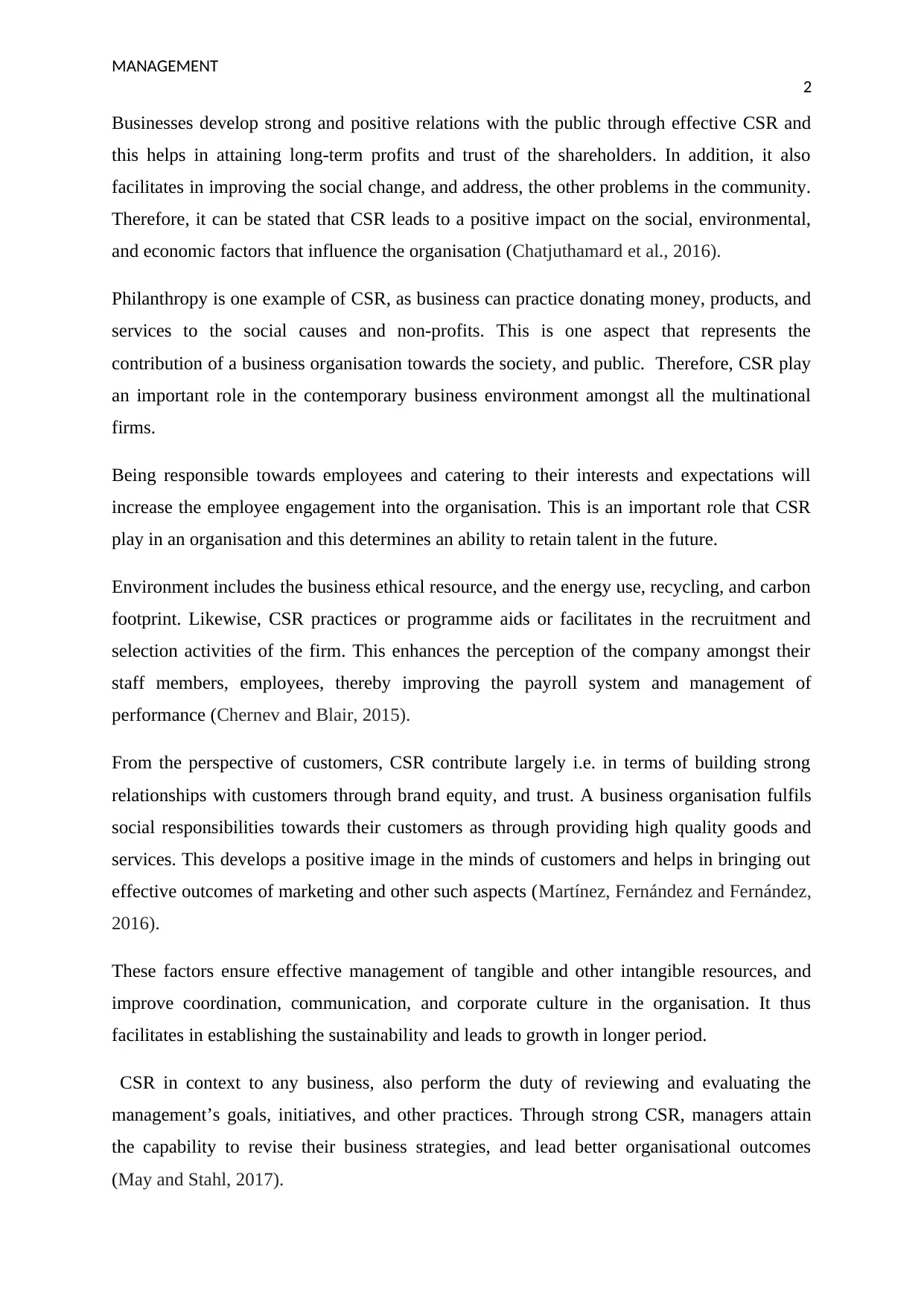
MANAGEMENT
2
Businesses develop strong and positive relations with the public through effective CSR and
this helps in attaining long-term profits and trust of the shareholders. In addition, it also
facilitates in improving the social change, and address, the other problems in the community.
Therefore, it can be stated that CSR leads to a positive impact on the social, environmental,
and economic factors that influence the organisation (Chatjuthamard et al., 2016).
Philanthropy is one example of CSR, as business can practice donating money, products, and
services to the social causes and non-profits. This is one aspect that represents the
contribution of a business organisation towards the society, and public. Therefore, CSR play
an important role in the contemporary business environment amongst all the multinational
firms.
Being responsible towards employees and catering to their interests and expectations will
increase the employee engagement into the organisation. This is an important role that CSR
play in an organisation and this determines an ability to retain talent in the future.
Environment includes the business ethical resource, and the energy use, recycling, and carbon
footprint. Likewise, CSR practices or programme aids or facilitates in the recruitment and
selection activities of the firm. This enhances the perception of the company amongst their
staff members, employees, thereby improving the payroll system and management of
performance (Chernev and Blair, 2015).
From the perspective of customers, CSR contribute largely i.e. in terms of building strong
relationships with customers through brand equity, and trust. A business organisation fulfils
social responsibilities towards their customers as through providing high quality goods and
services. This develops a positive image in the minds of customers and helps in bringing out
effective outcomes of marketing and other such aspects (Martínez, Fernández and Fernández,
2016).
These factors ensure effective management of tangible and other intangible resources, and
improve coordination, communication, and corporate culture in the organisation. It thus
facilitates in establishing the sustainability and leads to growth in longer period.
CSR in context to any business, also perform the duty of reviewing and evaluating the
management’s goals, initiatives, and other practices. Through strong CSR, managers attain
the capability to revise their business strategies, and lead better organisational outcomes
(May and Stahl, 2017).
2
Businesses develop strong and positive relations with the public through effective CSR and
this helps in attaining long-term profits and trust of the shareholders. In addition, it also
facilitates in improving the social change, and address, the other problems in the community.
Therefore, it can be stated that CSR leads to a positive impact on the social, environmental,
and economic factors that influence the organisation (Chatjuthamard et al., 2016).
Philanthropy is one example of CSR, as business can practice donating money, products, and
services to the social causes and non-profits. This is one aspect that represents the
contribution of a business organisation towards the society, and public. Therefore, CSR play
an important role in the contemporary business environment amongst all the multinational
firms.
Being responsible towards employees and catering to their interests and expectations will
increase the employee engagement into the organisation. This is an important role that CSR
play in an organisation and this determines an ability to retain talent in the future.
Environment includes the business ethical resource, and the energy use, recycling, and carbon
footprint. Likewise, CSR practices or programme aids or facilitates in the recruitment and
selection activities of the firm. This enhances the perception of the company amongst their
staff members, employees, thereby improving the payroll system and management of
performance (Chernev and Blair, 2015).
From the perspective of customers, CSR contribute largely i.e. in terms of building strong
relationships with customers through brand equity, and trust. A business organisation fulfils
social responsibilities towards their customers as through providing high quality goods and
services. This develops a positive image in the minds of customers and helps in bringing out
effective outcomes of marketing and other such aspects (Martínez, Fernández and Fernández,
2016).
These factors ensure effective management of tangible and other intangible resources, and
improve coordination, communication, and corporate culture in the organisation. It thus
facilitates in establishing the sustainability and leads to growth in longer period.
CSR in context to any business, also perform the duty of reviewing and evaluating the
management’s goals, initiatives, and other practices. Through strong CSR, managers attain
the capability to revise their business strategies, and lead better organisational outcomes
(May and Stahl, 2017).
⊘ This is a preview!⊘
Do you want full access?
Subscribe today to unlock all pages.

Trusted by 1+ million students worldwide
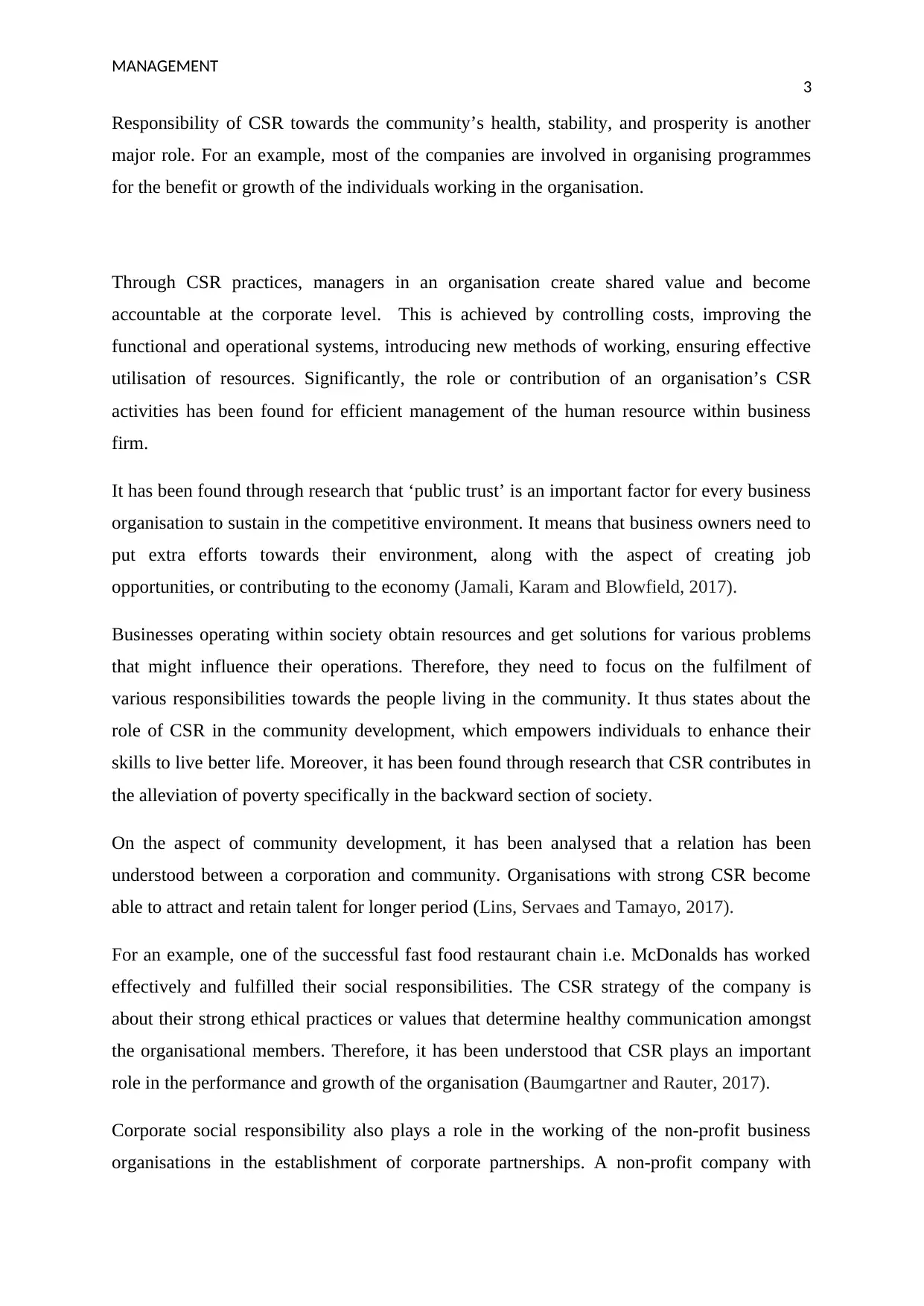
MANAGEMENT
3
Responsibility of CSR towards the community’s health, stability, and prosperity is another
major role. For an example, most of the companies are involved in organising programmes
for the benefit or growth of the individuals working in the organisation.
Through CSR practices, managers in an organisation create shared value and become
accountable at the corporate level. This is achieved by controlling costs, improving the
functional and operational systems, introducing new methods of working, ensuring effective
utilisation of resources. Significantly, the role or contribution of an organisation’s CSR
activities has been found for efficient management of the human resource within business
firm.
It has been found through research that ‘public trust’ is an important factor for every business
organisation to sustain in the competitive environment. It means that business owners need to
put extra efforts towards their environment, along with the aspect of creating job
opportunities, or contributing to the economy (Jamali, Karam and Blowfield, 2017).
Businesses operating within society obtain resources and get solutions for various problems
that might influence their operations. Therefore, they need to focus on the fulfilment of
various responsibilities towards the people living in the community. It thus states about the
role of CSR in the community development, which empowers individuals to enhance their
skills to live better life. Moreover, it has been found through research that CSR contributes in
the alleviation of poverty specifically in the backward section of society.
On the aspect of community development, it has been analysed that a relation has been
understood between a corporation and community. Organisations with strong CSR become
able to attract and retain talent for longer period (Lins, Servaes and Tamayo, 2017).
For an example, one of the successful fast food restaurant chain i.e. McDonalds has worked
effectively and fulfilled their social responsibilities. The CSR strategy of the company is
about their strong ethical practices or values that determine healthy communication amongst
the organisational members. Therefore, it has been understood that CSR plays an important
role in the performance and growth of the organisation (Baumgartner and Rauter, 2017).
Corporate social responsibility also plays a role in the working of the non-profit business
organisations in the establishment of corporate partnerships. A non-profit company with
3
Responsibility of CSR towards the community’s health, stability, and prosperity is another
major role. For an example, most of the companies are involved in organising programmes
for the benefit or growth of the individuals working in the organisation.
Through CSR practices, managers in an organisation create shared value and become
accountable at the corporate level. This is achieved by controlling costs, improving the
functional and operational systems, introducing new methods of working, ensuring effective
utilisation of resources. Significantly, the role or contribution of an organisation’s CSR
activities has been found for efficient management of the human resource within business
firm.
It has been found through research that ‘public trust’ is an important factor for every business
organisation to sustain in the competitive environment. It means that business owners need to
put extra efforts towards their environment, along with the aspect of creating job
opportunities, or contributing to the economy (Jamali, Karam and Blowfield, 2017).
Businesses operating within society obtain resources and get solutions for various problems
that might influence their operations. Therefore, they need to focus on the fulfilment of
various responsibilities towards the people living in the community. It thus states about the
role of CSR in the community development, which empowers individuals to enhance their
skills to live better life. Moreover, it has been found through research that CSR contributes in
the alleviation of poverty specifically in the backward section of society.
On the aspect of community development, it has been analysed that a relation has been
understood between a corporation and community. Organisations with strong CSR become
able to attract and retain talent for longer period (Lins, Servaes and Tamayo, 2017).
For an example, one of the successful fast food restaurant chain i.e. McDonalds has worked
effectively and fulfilled their social responsibilities. The CSR strategy of the company is
about their strong ethical practices or values that determine healthy communication amongst
the organisational members. Therefore, it has been understood that CSR plays an important
role in the performance and growth of the organisation (Baumgartner and Rauter, 2017).
Corporate social responsibility also plays a role in the working of the non-profit business
organisations in the establishment of corporate partnerships. A non-profit company with
Paraphrase This Document
Need a fresh take? Get an instant paraphrase of this document with our AI Paraphraser
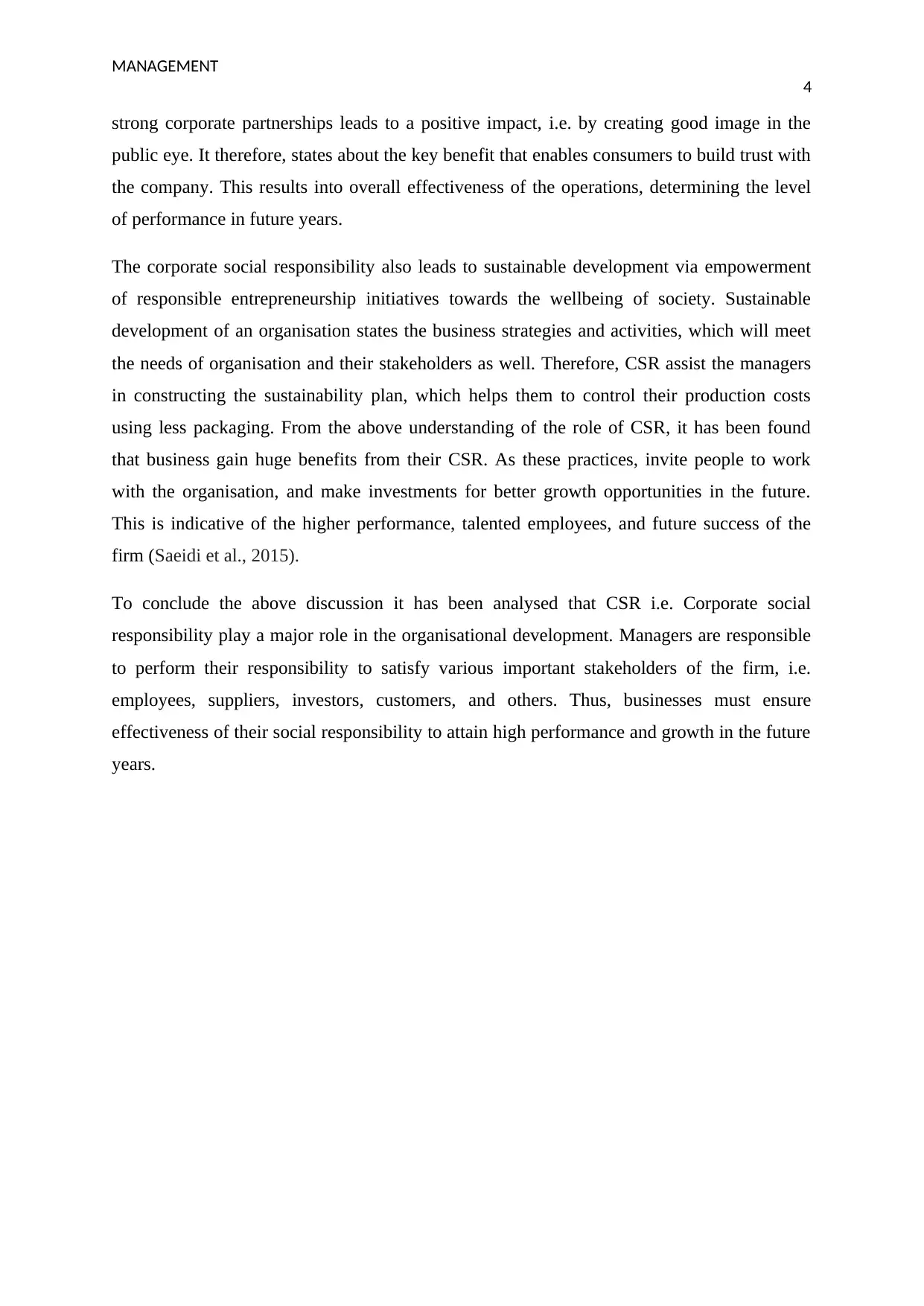
MANAGEMENT
4
strong corporate partnerships leads to a positive impact, i.e. by creating good image in the
public eye. It therefore, states about the key benefit that enables consumers to build trust with
the company. This results into overall effectiveness of the operations, determining the level
of performance in future years.
The corporate social responsibility also leads to sustainable development via empowerment
of responsible entrepreneurship initiatives towards the wellbeing of society. Sustainable
development of an organisation states the business strategies and activities, which will meet
the needs of organisation and their stakeholders as well. Therefore, CSR assist the managers
in constructing the sustainability plan, which helps them to control their production costs
using less packaging. From the above understanding of the role of CSR, it has been found
that business gain huge benefits from their CSR. As these practices, invite people to work
with the organisation, and make investments for better growth opportunities in the future.
This is indicative of the higher performance, talented employees, and future success of the
firm (Saeidi et al., 2015).
To conclude the above discussion it has been analysed that CSR i.e. Corporate social
responsibility play a major role in the organisational development. Managers are responsible
to perform their responsibility to satisfy various important stakeholders of the firm, i.e.
employees, suppliers, investors, customers, and others. Thus, businesses must ensure
effectiveness of their social responsibility to attain high performance and growth in the future
years.
4
strong corporate partnerships leads to a positive impact, i.e. by creating good image in the
public eye. It therefore, states about the key benefit that enables consumers to build trust with
the company. This results into overall effectiveness of the operations, determining the level
of performance in future years.
The corporate social responsibility also leads to sustainable development via empowerment
of responsible entrepreneurship initiatives towards the wellbeing of society. Sustainable
development of an organisation states the business strategies and activities, which will meet
the needs of organisation and their stakeholders as well. Therefore, CSR assist the managers
in constructing the sustainability plan, which helps them to control their production costs
using less packaging. From the above understanding of the role of CSR, it has been found
that business gain huge benefits from their CSR. As these practices, invite people to work
with the organisation, and make investments for better growth opportunities in the future.
This is indicative of the higher performance, talented employees, and future success of the
firm (Saeidi et al., 2015).
To conclude the above discussion it has been analysed that CSR i.e. Corporate social
responsibility play a major role in the organisational development. Managers are responsible
to perform their responsibility to satisfy various important stakeholders of the firm, i.e.
employees, suppliers, investors, customers, and others. Thus, businesses must ensure
effectiveness of their social responsibility to attain high performance and growth in the future
years.
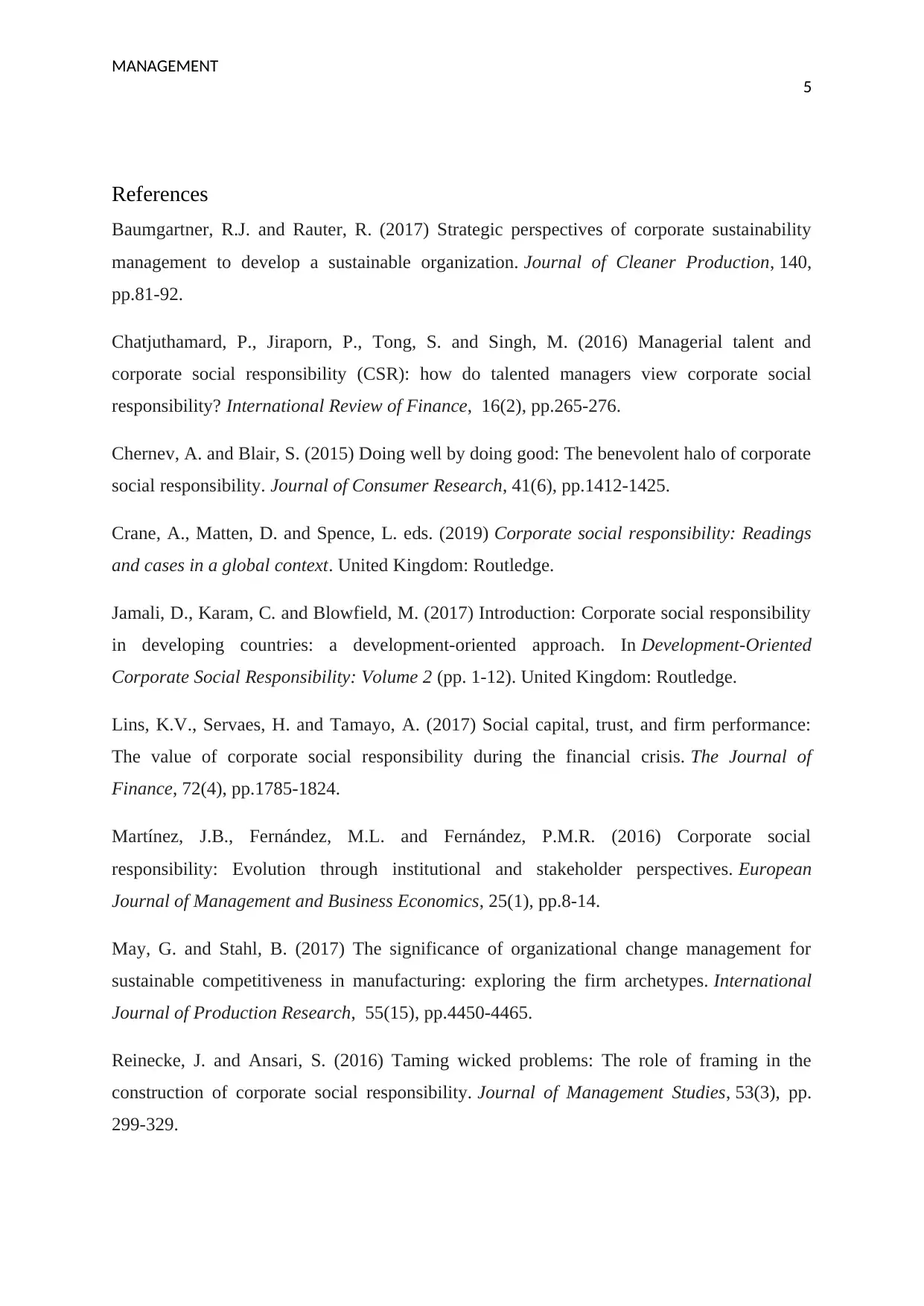
MANAGEMENT
5
References
Baumgartner, R.J. and Rauter, R. (2017) Strategic perspectives of corporate sustainability
management to develop a sustainable organization. Journal of Cleaner Production, 140,
pp.81-92.
Chatjuthamard, P., Jiraporn, P., Tong, S. and Singh, M. (2016) Managerial talent and
corporate social responsibility (CSR): how do talented managers view corporate social
responsibility? International Review of Finance, 16(2), pp.265-276.
Chernev, A. and Blair, S. (2015) Doing well by doing good: The benevolent halo of corporate
social responsibility. Journal of Consumer Research, 41(6), pp.1412-1425.
Crane, A., Matten, D. and Spence, L. eds. (2019) Corporate social responsibility: Readings
and cases in a global context. United Kingdom: Routledge.
Jamali, D., Karam, C. and Blowfield, M. (2017) Introduction: Corporate social responsibility
in developing countries: a development-oriented approach. In Development-Oriented
Corporate Social Responsibility: Volume 2 (pp. 1-12). United Kingdom: Routledge.
Lins, K.V., Servaes, H. and Tamayo, A. (2017) Social capital, trust, and firm performance:
The value of corporate social responsibility during the financial crisis. The Journal of
Finance, 72(4), pp.1785-1824.
Martínez, J.B., Fernández, M.L. and Fernández, P.M.R. (2016) Corporate social
responsibility: Evolution through institutional and stakeholder perspectives. European
Journal of Management and Business Economics, 25(1), pp.8-14.
May, G. and Stahl, B. (2017) The significance of organizational change management for
sustainable competitiveness in manufacturing: exploring the firm archetypes. International
Journal of Production Research, 55(15), pp.4450-4465.
Reinecke, J. and Ansari, S. (2016) Taming wicked problems: The role of framing in the
construction of corporate social responsibility. Journal of Management Studies, 53(3), pp.
299-329.
5
References
Baumgartner, R.J. and Rauter, R. (2017) Strategic perspectives of corporate sustainability
management to develop a sustainable organization. Journal of Cleaner Production, 140,
pp.81-92.
Chatjuthamard, P., Jiraporn, P., Tong, S. and Singh, M. (2016) Managerial talent and
corporate social responsibility (CSR): how do talented managers view corporate social
responsibility? International Review of Finance, 16(2), pp.265-276.
Chernev, A. and Blair, S. (2015) Doing well by doing good: The benevolent halo of corporate
social responsibility. Journal of Consumer Research, 41(6), pp.1412-1425.
Crane, A., Matten, D. and Spence, L. eds. (2019) Corporate social responsibility: Readings
and cases in a global context. United Kingdom: Routledge.
Jamali, D., Karam, C. and Blowfield, M. (2017) Introduction: Corporate social responsibility
in developing countries: a development-oriented approach. In Development-Oriented
Corporate Social Responsibility: Volume 2 (pp. 1-12). United Kingdom: Routledge.
Lins, K.V., Servaes, H. and Tamayo, A. (2017) Social capital, trust, and firm performance:
The value of corporate social responsibility during the financial crisis. The Journal of
Finance, 72(4), pp.1785-1824.
Martínez, J.B., Fernández, M.L. and Fernández, P.M.R. (2016) Corporate social
responsibility: Evolution through institutional and stakeholder perspectives. European
Journal of Management and Business Economics, 25(1), pp.8-14.
May, G. and Stahl, B. (2017) The significance of organizational change management for
sustainable competitiveness in manufacturing: exploring the firm archetypes. International
Journal of Production Research, 55(15), pp.4450-4465.
Reinecke, J. and Ansari, S. (2016) Taming wicked problems: The role of framing in the
construction of corporate social responsibility. Journal of Management Studies, 53(3), pp.
299-329.
⊘ This is a preview!⊘
Do you want full access?
Subscribe today to unlock all pages.

Trusted by 1+ million students worldwide

MANAGEMENT
6
Saeidi, S.P., Sofian, S., Saeidi, P., Saeidi, S.P. and Saaeidi, S.A. (2015) How does corporate
social responsibility contribute to firm financial performance? The mediating role of
competitive advantage, reputation, and customer satisfaction. Journal of business
research, 68(2), pp.341-350.
6
Saeidi, S.P., Sofian, S., Saeidi, P., Saeidi, S.P. and Saaeidi, S.A. (2015) How does corporate
social responsibility contribute to firm financial performance? The mediating role of
competitive advantage, reputation, and customer satisfaction. Journal of business
research, 68(2), pp.341-350.
1 out of 7
Related Documents
Your All-in-One AI-Powered Toolkit for Academic Success.
+13062052269
info@desklib.com
Available 24*7 on WhatsApp / Email
![[object Object]](/_next/static/media/star-bottom.7253800d.svg)
Unlock your academic potential
Copyright © 2020–2026 A2Z Services. All Rights Reserved. Developed and managed by ZUCOL.




